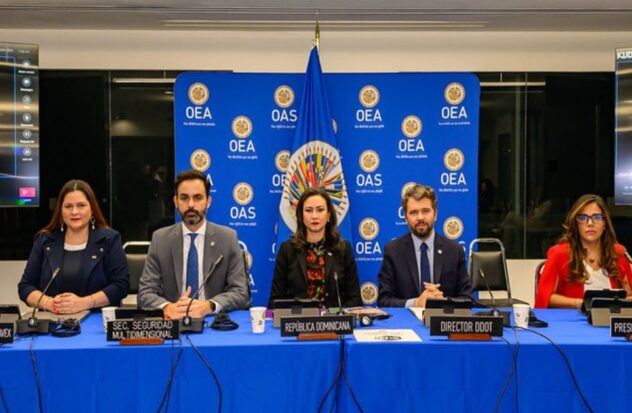MIAMI.- For two days, the Group of Experts for Money Laundering Control (GELAVEX) of the Organization of American States (OAS) deliberated in Washington on new criminal modalities in Latin America to deepen regional cooperation with the application of technological advances and artificial intelligence. .
The two GELAVEX work sessions were coordinated by Aileen Guzmán Coste, pro tempore president of the Group and Gastón Schulmeister, Director of the Department against Transnational Organized Crime (DDOT) of the OAS.
The International Monetary Fund (IMF) and the United Nations Office on Drugs and Crime They estimate that global money laundering transactions are equivalent to between 2% and 5% of the Gross Domestic Product worldwide and that less than 1% of that capital manages to be seized, hence the importance of the issue.
The illegal marketing of narcotics and human trafficking are the main crimes committed in Latin America, according to official data published by Interpol, the International Police Organization, considered at the conference. However, with technological advances, other modalities are imposed.
The role of the Group of Experts is fundamental to facilitate a hemispheric approach, reviewing latent institutional challenges; addressing the emergence of rising activities, such as environmental crimes and their link with money laundering, and also seeking to be at the forefront of understanding how new technologies are used in organized crime on the one hand, at the same time that offer us tools to combat it,” Schulmeister said at the beginning of the deliberations.
Experts from several countries from both the public and private sectors participated in the meeting.. All the speakers agreed on the need to coordinate efforts and apply new technologies and artificial intelligence to confront unprecedented modus operandi that have already buried binary investigations and the collection of background information in computer files, of which the entity’s group of experts multilateral took note.
James S. Markley, Criminal Investigation Division – Financial Crimes Section (FCS) of the Federal Bureau of Investigation (FBI), gave a detailed presentation on the need to use artificial intelligence to catch up with transnational cartels that apply technology of the latest generation to execute their crimes.
Create responses
The FBI has indicated that cybercriminals use phishing campaigns (scam emails and phone calls) y “smishing” , a cyberattack that targets individuals via SMS (short message service) to attack retail employees and create fraudulent gift cards. He believes that a response plan for these incidents should be created as a first step to mitigate the threat.
The FBI representative added that China operates in the region and participates in certain crimes that report million-dollar profits. These benefits -completed the FBI expert- are laundered in bulk and almost without control due to the technological weaknesses of the security forces, as reported by Infobae.
At this international meeting, the South American Football Confederation (Conmebol) also expressed its commitment to combat corruption and money laundering head-on.
“At Conmebol we transform the challenge of preventing money laundering into an opportunity to reaffirm our commitment to integrity and transparency in South American football. We have robust tools to ensure that all our operations reflect our values,” said CONMEBOL Director of Ethics and Compliance, Graciela Garay.
Strengthen financial systems
“The growth of the Fintech (financial technology) sector in Latin America is very relevant, having become a fundamental driver of local economies. It has particularities and challenges that are different from the traditional financial system, so it is important to address it appropriately and think about scalable technological solutions that make crime prevention more efficient and effective,” María del Sol Muñoz posted on X (formerly Twitter). director of Mercado Libre, part of her presentation at this event.
At the conclusion of the deliberations, the experts committed to deepening cooperation in the face of a transnational enemy that has infinite resources and moves faster than institutional decisions.
The next meeting will be in the Dominican Republic, the first event outside the headquarters after the 2019 pandemic. The need to strengthen financial systems was discussed, with addressing the challenges of digital risk remaining a crucial task.
Source: Department Against Organized Crime of the OAS/ Infobae / Diario las Américas



